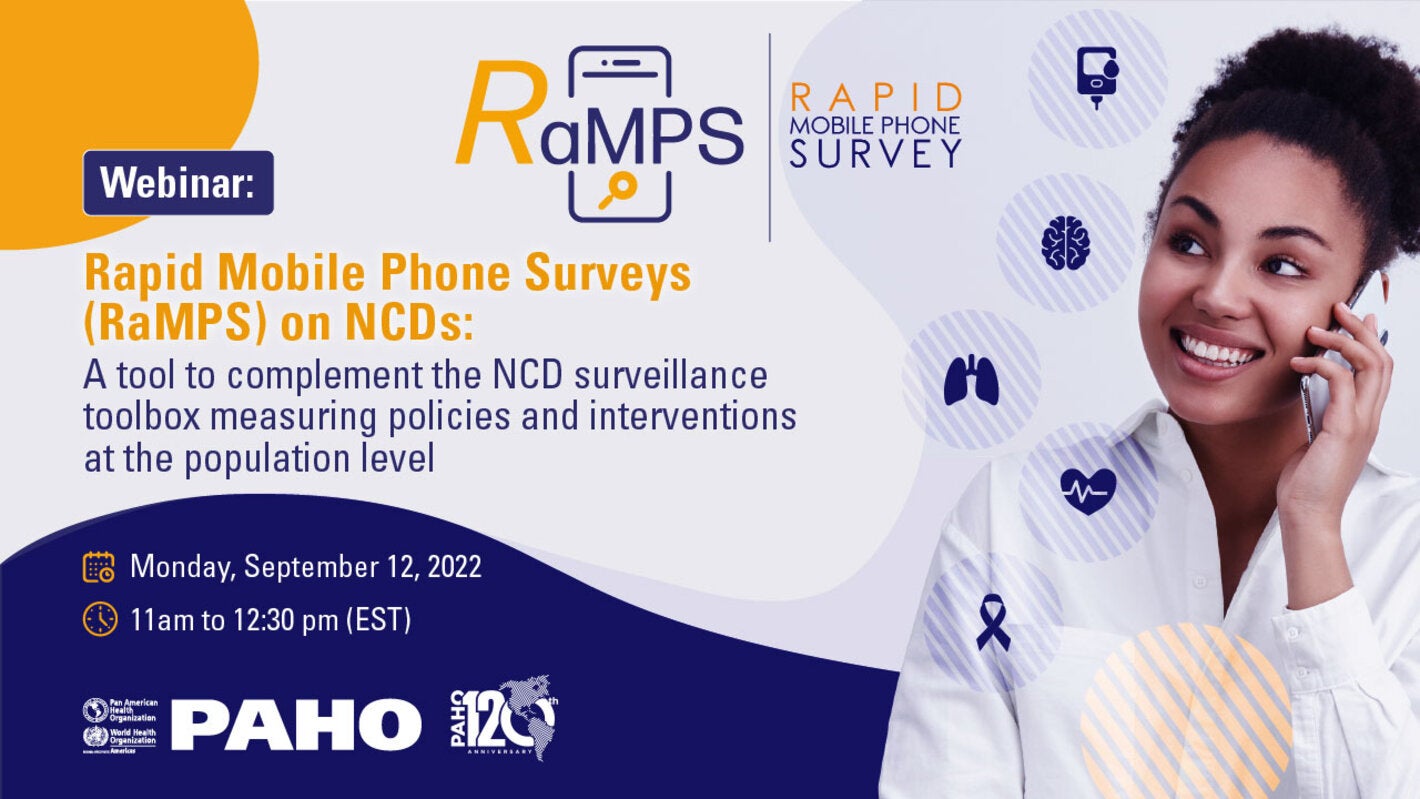
A tool to complement the NCD surveillance toolbox measuring policies and interventions at the population level
Join us on Monday, 12 September 2022, on the webinar "Rapid Mobile Phone Surveys (RaMPS) on NCDs", that will present the experience and effectiveness of Rapid Mobile Phone Surveys to gather timely data on noncommunicable diseases (NCDs) policies and interventions and cases of phone surveys implementation in selected countries.
The session is aimed to:
- Ministry of Health (NCDs focal points; mental health focal points; areas of health statistics, information, surveillance, planning and evaluation) and subnational level health entities from countries of the Americas.
- Civil Society, Academia and agencies interested in surveillance and monitoring of NCDs and their risk factors.
- PAHO/WHO NMH staff at the regional, subregional, and national offices.
How to participate
- DATE: Monday, 12 September, 2022
- TIME: 11.00 a.m. to 12:30 p.m. (EDT)
- LANGUAGE: Spanish, English and Portuguese, with simultaneous interpretation in all languages.
- LINK TO REGISTER: https://paho-org.zoom.us/webinar/register/WN_9OkbmfCyTDmvpU8WxdS5Gg
Recording
Portuguese: https://youtu.be/rEtdIEu0hOQ
Background
The Pan American Health Organization/World Health Organization (PAHO/WHO) is committed to support countries to strengthen their national capacity on surveillance, produce quality data and contribute to the use of data for policymaking. As part of this effort, PAHO has identified opportunities and strategies to produce data on NCDs to rapidly assess NCD policies and interventions using Rapid Mobile Phone Surveys (RaMPS) based on learnings from the COVID-19 pandemic.
The COVID-19 pandemic exposed the social disparities of health and disproportionately affected persons living with noncommunicable diseases (NCDs), especially those in vulnerable situations. Timely data became relevant to enable a quick response during this public health crisis, while continuing to support the assessment of the NCDs quality of care.
PAHO/WHO launched the RaMPS initiative in 2020, as a tool to complement the NCD surveillance toolbox measuring policies and interventions at the population level. RaMPS is conducted in adult population and have the potential to produce timely, affordable, and reliable data on the implementation of the NCD Best Buys. For instance, national legislative processes related to NCDs, and its risk factors may be supported by data on behaviors, knowledge, attitudes and practices of the population regarding health and protective measures.
The implementation of RaMPS in the Americas is a joint effort of PAHO, the U.S. Centers for Diseases Control and Prevention (CDC) and RTI International and builds on previous experiences conducted in several countries.
For more information about this tool, visit the page RaMPS: Rapid Mobile Phone Survey
Agenda
Moderator/Facilitator:
Silvana Luciani. Unit Chief, Noncommunicable Diseases, Violence and Injuries Prevention Unit, PAHO.
- 11:00 am Welcome
- 11:05 am Opening remarks. The need to strengthen NCD surveillance in the Americas.
- Anselm Hennis, Director, Noncommunicable Diseases and Mental Health, PAHO
- 11:10 am PAHO initiative - RaMPS: measuring NCD policies and interventions at the population level
- Roberta Caixeta, Advisor, NCD surveillance, prevention, and control, PAHO
- 11:20 am International initiatives and experiences using phone surveys as a surveillance tool
- 11:25 am Phone surveys modes used for data collection
- Veronica Lea, Team Lead, Surveillance and Information Systems Team, CDC
- 11:35 am Using high frequency phone surveys to measure socioeconomic status in the context of COVID and beyond
- Talip Kilic, Senior Economist, Living Standards Measurement Study (LSMS), Data Production and Methods Unit, World Bank
- 11:45 am Vigitel: one of the NCD surveillance tools used by Brazil
- To be determined
- 11:55 am RaMPS in Paraguay.
- Rodrigo Burgos, Researcher of the Surveillance and Information Department. NCD Surveillance Directorate, Ministry of Public Health and Social Welfare, Paraguay.
- 12:05 pm Scaling up the RaMPS initiative – phase II.
- Dolores Ondarsuhu, Technical officer, NCD Data Analytics, PAHO
- 12:10 pm Questions and answers
- 12:20 pm Closing remarks: Timely data to respond to countries need and assessment of policies and interventions.
- Silvana Luciani, Unit Chief, Noncommunicable Diseases and Violence Prevention Unit, PAHO
Time correspondence
- 8:00 am.– Los Angeles
- 9:00 am. – Belmopan, Guatemala City, Managua, San Jose (CR), San Salvador, Tegucigalpa
- 10:00 am. – Bogota, Mexico City, Panama City, Kingston, Lima, Quito
- 11:00 am. – Asunción, Bridgetown, Caracas, Castries, Georgetown, Havana, La Paz, Nassau, Ottawa, Port-au-Prince, Port of Spain, San Juan, Santiago, Santo Domingo, Washington DC
- 12:00 pm - Buenos Aires, Brasilia, Montevideo, Paramaribo
- 5:00 pm. – Geneva, Madrid
For other cities, check the time in the following link
Related links
-
RaMPS: Rapid Mobile Phone Survey
-
ENLACE: Data Portal on Noncommunicable Diseases, Mental Health, and External Causes
-
Noncommunicable Diseases (topic page)
-
Department of Noncommunicable Diseases and Mental Health
